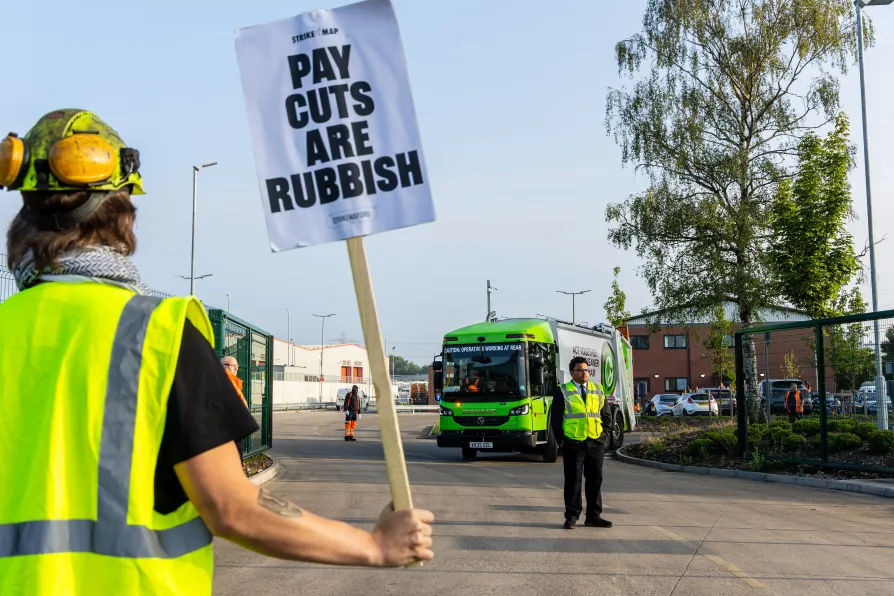
 Bin lorries reverse back into the depot at the Birmingham megapicket. Photo: Neil Terry Photography
Bin lorries reverse back into the depot at the Birmingham megapicket. Photo: Neil Terry Photography
THE mega picket backing the Birmingham bin workers was a welcome revival of a tactic to defeat the anti-union law “reforms” which Thatcher imposed, and successive governments maintained, in order to weaken unions and render unlawful industrial and solidarity action.
The mega picket tapped into a strengthening seam of opinion which is crystallising into an understanding that while it seems increasingly unlikely that this present parliament will do very much to widen workers’ rights — even to fully implement the much watered-down proposals which Labour paraded during the election — workers themselves can take the initiative.
Strike Map’s valuable initiative in showcasing industrial action and popularising both the various historical antecedents for workers’ challenges to state and employer power, and co-ordinating this initiative, signifies a welcome change of mood and tempo with more than a hint of audacity.
When late 20th century governments of both Labour and Conservative complexion tried a frontal assault on the rights and immunities workers had won over the previous decades, they failed. As a consequence, the Tory governments, at the behest of employers, adopted a “salami-slice” approach to weaken unions incrementally. In each case, parliamentary opposition was useless in challenging this assault by stealth and while Labour in opposition promised something, it delivered little in government.
Characteristically, the Blair and Brown governments left much of the Tory architecture of industrial law unchanged.
Where workers and their organisations are willing to take action to render these laws inoperable, our own salami-style tactics can be employed to change — in fact, if not in law — the balance of power between workers and employers.
The notion that pickets can be limited to a handful of workers actually involved in a dispute is away with the fairies. The last strike wave washed that away on a tide of mass picketing while Mick Lynch’s quiet humour made a mockery of media types whose failure to comprehend the mentality of workers in action left them struggling to explain that a change was taking place.
When laws lose their cloak of legitimacy, every challenge to the employer and the state power that stands behind them becomes a political challenge.
We are now approaching a situation in which the legitimacy of government itself is questioned.
The Tories are toast, and Labour’s complicity in the Gaza genocide is fused in the minds of millions with contempt for its assault on the disabled, family and children’s benefits, winter fuel allowances for pensioners and the callous notion that Nato’s war drive to ramp up arms expenditure necessitates an attack on welfare.
More than one generation has now experienced austerity and seen imperialist wars devastate the lives of millions, while our streets have seen mass demonstrations against genocide, war and poverty repeated week after week.
As the climate crisis approaches a tipping point, the question that is beginning to become salient among people who understand the gravity of the situation is this: is action to mitigate this crisis possible without a profound change in the direction of government policy or even under capitalism?
Traditionally, political advance was seen as hinging on left unity and in every industry and trade union, in the peace movement and in action against austerity, people of diverse opinions have found a way to work together.
This has always found a political and electoral expression, but now the terrain on which the working-class movement finds allies among diverse sections of the population is growing.
The strategic question which presents itself, and which everyone has a stake in resolving, is how to bring every element of the popular struggle together and how to give it robust organisational form and clear leadership.

BEN CHACKO says in different ways, the centenary of the General Strike and that of Fidel Castro’s birth point to priority tasks for the British left in the coming year

Starmer sabotaged Labour with his second referendum campaign, mobilising a liberal backlash that sincerely felt progressive ideals were at stake — but the EU was then and is now an entity Britain should have nothing to do with, explains NICK WRIGHT

Deep disillusionment with the Westminster cross-party consensus means rupture with the status quo is on the cards – bringing not only opportunities but also dangers, says NICK WRIGHT










